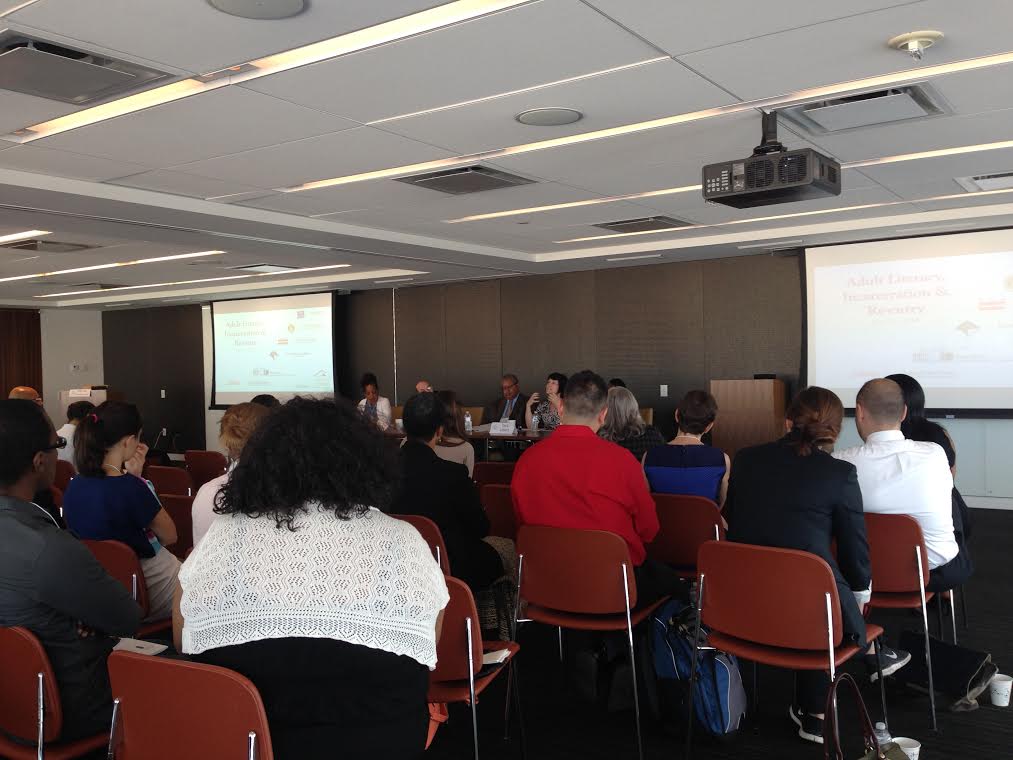Approximately 2,200 formerly-incarcerated individuals return to the District yearly, estimated Charles Thornton from the Office of Returning Citizens Affairs during a recent panel discussion on adult literacy and incarceration, organized by the Academy for Hope.
Most of us “don’t know what educational opportunities exist within [penal] institutions because we’re not there,” Thornton pointed out. Incarcerated residents often have to compete for educational opportunities within jails and prisons, and D.C. inmates often face specific stigma within Federal facilities, Thornton said during the July 31 panel discussion.
In addition to Thornton, the panel featured representatives from other public agencies and advocacy groups, returning citizens, and other community activists. Discussion focused on the connections between adult literacy and the successful re-entry of incarcerated citizens into society.
The incidence of illiteracy among incarcerated and re-entering populations is now well-known, often in terms of the “school to prison pipeline.” According to the American Civil Liberties Union, children with “learning disabilities or histories of poverty, abuse or neglect [who] would benefit from additional educational and counseling services…are isolated, punished and pushed out” of public schools and into the criminal justice systems.
Once the children are released from criminal justice systems, their educational deficit often poses a significant barrier to their employment, said Cedric Hendricks, another panelist and a representative of the Court Services and Offender Supervision Agency (CSOSA).
Organizations like CSOSA work to arm individuals with knowledge and skills to counterbalance their criminal histories through programs such as learning labs (digital learning centers) and Vocational Opportunities, Training and Education.
Many employers in the DC area remain reluctant to hiring re-entering citizens who may lack the necessary skills to match their open positions, and the skill development programs available are largely ineffective and unsupportive, Hendricks said. Despite the programs and tools offered by CSOSA, 50% of the agency’s employable clients remain unemployed, which Hendricks attributed to the sheer extent and complexity of the social and educational struggles of his clients.
Though institutional challenges are not uncommon, educational programs are the most important key to ensuring the success of re-entering citizens, and institutional abandonment poses a significant deterrent to adult learning, argued Tara Libert, another panelist and co-founder of Free Minds Book Club.
Free Minds serves teenagers charged and incarcerated as adults at the DC jail by offering creative writing mentorship and support programs.
“Twelve years and eight hundred young men [after the founding of Free Minds]”, said Libert, “thousands of books have been read and tens of thousands of poems written, proving that all that is needed is a link between the resources and the youth.”
Loretta, another panelist, spoke of her personal journey through the educational and the criminal justice systems. Struggling for many years with mental illness, homelessness, and poverty, Loretta had yet to graduate middle school at the age of 19. Pushed out of her public school for being too old, Loretta said she succumbed to educational frustrations and left the pursuit of schooling.
She spent 15 years in and out of correctional institutions, where she was intimidated by the educational programs offered and could not find instruction at her level of learning. Although she actively sought employment upon her release, her lack of employable skills left her unqualified for most of her desired positions, Loretta relayed.
Finally, Loretta found a GED program at Southeast Ministry that she described as supportive and patient, and she successfully took two computer classes. She taught herself to read and has been relentlessly pursuing learning opportunities, which have given her access to more and more management positions and a chance to support her children through their own education. “I’m still rising,” concluded Loretta, invoking Maya Angelou’s poem, “Still I Rise.”
Following Loretta’s story, Jesse Janetta from the Urban Institute reminded the audience that “partnership is key” in order to successfully reintegrate citizens from jail.
“Everyone comes back from prison having received an education,” he said. “That education could be that society doesn’t care, that they should suppress trauma, or that they can procure narcotics through certain means. It is not whether incarcerated individuals receive an education, but what kind of education they come back with that matters.”
Each panelist made clear that once resources, encouragement, and individuals are connected, opportunities and futures are born.
Following the panel, audience members submitted questions on notecards for the panelists to answer. Questions addressed topics such as Certificates of Good Standing for Ex-Offenders, the unique challenges of incarcerated immigrants or non-English speakers, and possible employer actions to create a more welcoming hiring environment for returning citizens.
An upcoming event targeted at DC, employers will discuss how to consider felony records when hiring employees, and will recognize employers with effective hiring and training programs for re-entering citizens.
Giving Adults the Tools to Leave Prison Behind

Damayanti Desai
Issues |Education
email updates
We believe ending homelessness begins with listening to the stories of those who have experienced it.
Subscribe






